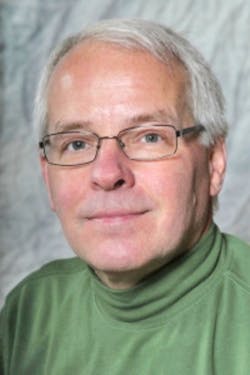Executive Editor
The power grid has been in the news lately—ranging from techniques for improving system utilization to the devastation in Puerto Rico. On the good-news front, NI announced in September a collaborative effort with Innovari to help utility companies around the world manage distributed energy resources and foster relationships between customers, local communities, and regulators. Innovari’s Interactive Energy Platform (IEP) includes hardware that attaches to participant buildings to deliver two-way communication of energy information to help balance edge-of-grid resources. The hardware incorporates CompactRIO single-board controllers and LabVIEW software for distributed sensing and control. The IEP has been put to use by utilities including Kansas City Power & Light and Mumbai-based Reliance Infrastructure (RInfra). The latter implemented the IEP on commercial buildings and mobile generators to stabilize the grid in regional areas under stress.
In related news, IHS suggests that the United States power grid is in danger of losing its power-supply diversity, increasing the cost and variability of power bills and creating negative macroeconomic impacts. In a new study titled Ensuring Resilient and Efficient Electricity Generation: The Value of the Current Diverse U.S. Power Supply Portfolio, the firm says that policy-driven market distortions could precipitate a less-efficient diversity portfolio where some U.S. power systems could have no meaningful contributions from coal or nuclear resources and a smaller contribution from hydroelectric resources—instead relying on wind, solar, and other intermittent resources.
Of course, the way to make effective use of intermittent sources is to store energy during periods of peak production. Timmons Roberts at Brookings recounts how the 19th century Rhode Island industrialist Zachariah Allen built a series of reservoirs to power his water-driven mills during dry summers. “This is a remarkable achievement,” writes Roberts. “On a modest river, Allen had essentially created grid storage of 84 days capacity for everyone downstream.”
The modern equivalents of Allen’s reservoirs are batteries, with entrepreneurs like Elon Musk standing in for Allen. Batteries—not coal—may hold promise for Puerto Rico, where Hurricane Maria destroyed much of the island’s power system. Lewis M. Milford and Mark Muro at Brookings note that as of mid-October, only about 15% of the system had been restored. They note that restoring the current system—with centralized oil- or coal-fired plants—could take months or years. Meanwhile, lives are at risk.
But Milford and Muro are hoping for a silver lining to the storm. “Into this dangerous power breach comes Elon Musk, the peripatetic disruptor of multiple industries, from autos to space travel, and now the electric power sector,” they write. “He has already started sending Tesla batteries to Puerto Rico, to be installed with solar as an emergency measure to provide power to critical facilities.”
Such an initiative could extend beyond the emergency effort. It could replace the existing system with a localized, independent, resilient, and less costly system. Milford and Muro report that Musk says he can implement distributed onsite solar and storage capability quickly to power homes and commercial buildings.
Milford and Muro note, “It often takes a dramatic moment to shift such a niche technology to mainstream success.” They cite a previous example recounted in the book Seabiscuit. In 1905, cars were not selling well in San Francisco, with the horse considered adequate for reliable transportation. When the 1906 earthquake and ensuing fires hit, however, cars proved their worth as emergency vehicles that could traverse fiery streets where horses refused to go. They write that the San Francisco disaster moved the automobile from a niche technology to the mainstream.
A similar technology transition could occur with Puerto Rico’s power system, they write, if dedicated companies like Musk’s can work with a creative local government that has strong federal support.
About the Author

Rick Nelson
Contributing Editor
Rick is currently Contributing Technical Editor. He was Executive Editor for EE in 2011-2018. Previously he served on several publications, including EDN and Vision Systems Design, and has received awards for signed editorials from the American Society of Business Publication Editors. He began as a design engineer at General Electric and Litton Industries and earned a BSEE degree from Penn State.

